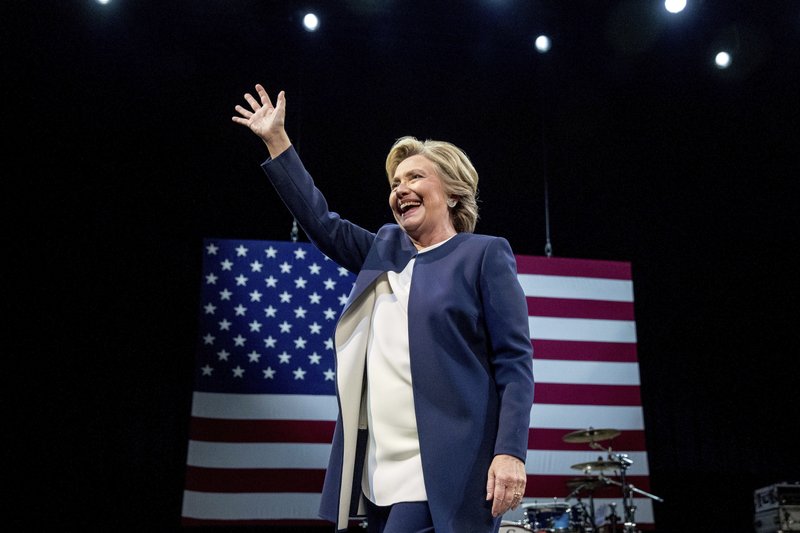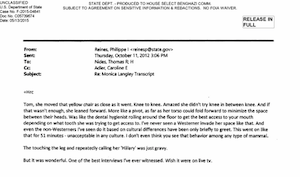WASHINGTON -- Hillary Clinton's campaign asked former President Bill Clinton to cancel a speech to a Wall Street investment firm last year just as the former secretary of state was about to announce her White House bid, newly released emails show.
RELATED ARTICLE
http://www.arkansas…">New accusers surface as Trump fights back
The emails, in suggesting the cancellation, cite concerns that the Clintons might appear to be too cozy with Wall Street.
Clinton aides say in hacked emails released Friday by the anti-secrecy group WikiLeaks that Hillary Clinton did not want her husband to cancel the speech, but after a "cool down period" was eventually convinced that canceling was the right step.
Campaign manager Robby Mook said he realized that canceling the lucrative speech would disappoint both Clintons but "it's a very consequential unforced error and could plague us in stories for months."
[INTERACTIVE: The 2016 election in Arkansas]
The Clintons' paid speeches have been an issue throughout the campaign, particularly Hillary Clinton's private speeches to Wall Street firms. Hillary Clinton earned about $1.5 million in speaking fees before launching her presidential campaign, while Bill Clinton reaped more than $5 million from banking, tech and other corporate interests, according to financial documents filed by Hillary Clinton.
The campaign has never released transcripts of Hillary Clinton's speeches, but the hacked emails did reveal excerpts flagged by her advisers as potentially concerning.
In the excerpts, Clinton talked about dreaming of "open trade and open borders" in the Western Hemisphere. She also says politicians sometimes need to have "both a public and a private position" on issues. A section of the excerpts focuses on China, featuring several issues in which Clinton said she confronted the Chinese while leading the U.S. State Department.
Bill Clinton was scheduled to speak to Morgan Stanley executives in April 2015, a few days after his wife was set to launch her bid for president.
"That's begging for a bad rollout," Mook wrote in a March 11, 2015, email.
In a later email, Mook says he feels "very strongly that doing the speech is a mistake" with serious potential consequences for Hillary Clinton's campaign. "People would (rightfully) ask how we let it happen."
Hillary Clinton was scheduled to campaign in Iowa, "where caucus goers have a sharply more negative view of Wall Street than the rest of the electorate," Mook wrote. "Wall Street ranks first for Iowans among a list of institutions that 'take advantage of every day Americans,' scoring twice as high as the general election electorate. ... This is a very big deal in my view."
Clinton's longtime aide, Huma Abedin, assured Mook the next day that Clinton was fine with canceling the speech, especially if Bill Clinton agreed. The candidate "just needed a cool down period," Abedin wrote.
The emails were among thousands published this week by WikiLeaks, which has been releasing a series of emails hacked from the accounts of Clinton campaign chairman John Podesta.
U.S. intelligence officials last week blamed the Russian government for a series of breaches intended to influence the presidential election. The Russians deny involvement.
Clinton spokesman Jennifer Palmieri said Friday that the campaign has taken unspecified precautions to secure its emails. Asked whether officials were considering releasing all of Podesta's emails at once, Palmieri said, "That is what the Russians would like us to do, and we are not going to do that."
North Korea, China
In the excerpts from speeches given privately that were found in the emails, Clinton said the U.S. would "ring China with missile defense" if the Chinese government failed to curb North Korea's nuclear program.
China has harshly criticized the U.S. and South Korea's planned deployment of a missile-defense system against North Korea, which conducted its fifth nuclear test this year. But Clinton said she told Chinese officials that the U.S. might deploy more ships to the region to contain the North Korean missile threat.
If North Korea successfully obtains a ballistic missile, it could threaten not just American allies in the Pacific, "but they could actually reach Hawaii and the west coast theoretically," Clinton said.
"We're going to ring China with missile defense. We're going to put more of our fleet in the area," Clinton said in a 2013 speech. "So China, come on. You either control them or we're going to have to defend against them."
China is North Korea's economic lifeline and the closest thing it has to a diplomatic ally, and China has been criticized by the U.S. and others for not doing enough to rein in North Korea's nuclear ambitions. Chinese officials and state media have responded by saying that North Korea is not solely China's responsibility, and that China has limited influence with secretive leader Kim Jong Un's hard-line communist regime.
Clinton also privately criticized China's position on another sensitive issue, the South China Sea. China claims almost the entirety of the strategically vital body of water and has lashed out at an international tribunal's July ruling rejecting its claims.
Clinton told a different audience in 2013 that by China's logic, the U.S. after World War II could have labeled the Pacific Ocean the "American Sea."
"My counterpart sat up very straight and goes, 'Well, you can't do that,'" she said. "And I said, 'Well, we have as much right to claim that as you do. I mean, you claim [the South China Sea] based on pottery shards from, you know, some fishing vessel that ran aground in an atoll somewhere."
In another remark revealed in the WikiLeaks hack, Clinton called Chinese President Xi Jinping "a more sophisticated, more effective public leader" than his predecessor, Hu Jintao. She noted Xi's plans for economic and social reforms, but blamed what she called "a resurgence of nationalism" on the Chinese government.
China's Ministry of Foreign Affairs did not immediately respond Friday to faxed questions about Clinton's remarks.
Information for this article was contributed by Julie Pace, Catherine Lucey, Andrew Taylor, Mary Clare Jalonick, Nomaan Merchant and Christopher Bodeen of The Associated Press.
A Section on 10/15/2016

